
Editor's Note: This post was published in 2006. Stats were updated in 2016 to reflect Belichick's current coaching record -- and the CD and TiVo references were left for posterity.
Many of you who are football fans or are from New England probably know who Bill Belichick is. For the rest of you, he is the head coach of the New England Patriots. Since he joined the organization in 2000, the Patriots have won five Super Bowls.
As a student of business strategy, I find Belichick to be a fascinating character. His accomplishment of winning five Super Bowls is truly remarkable because the market (NFL) he competes in is "efficient" by design, and rebalances itself to increase efficiency in clever ways.
Every year, the teams that were top performers the prior year are penalized by getting lower relative draft picks than the teams that didn't perform as well. In addition, the NFL has a salary cap, so even if your team sells out every game, has massive endorsement deals, and humongous TV deals as a result of winning all those Super Bowls, there is a cap on spending that puts you at the same level as every other team.
I had a chance to listen to the Bill Belichick biography by David Halberstam over the weekend on CD and also happened to watch his interview on 60 minutes that I TiVo'd awhile back. Here are some of the highlights I pulled out of the two that are both relative to his management style and his competitive strategy formulation.
8 Timeless Business Lessons From Bill Belichick
Lesson #1: Skills and performance matter more than tenure. [Tweet this]
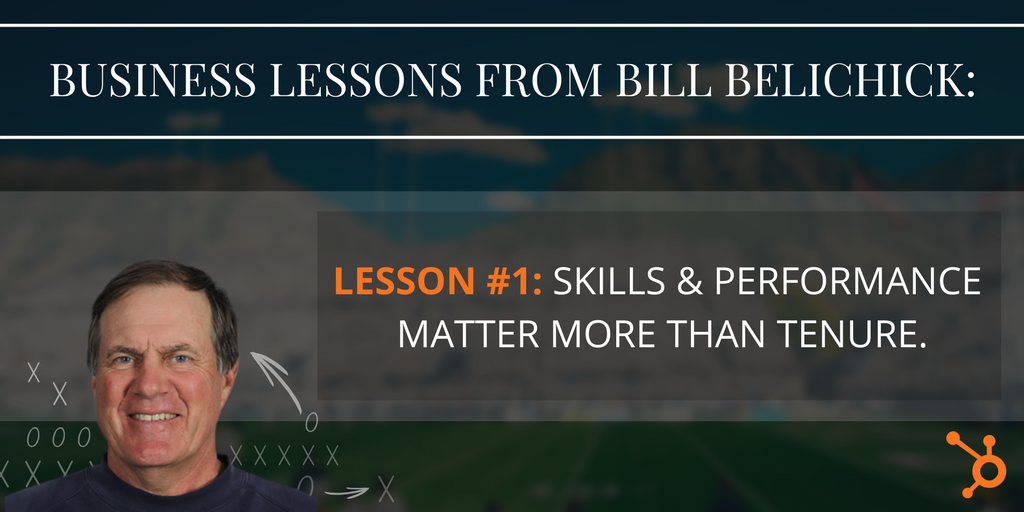
Belichick does not believe in "tenured" jobs for his players. They are constantly evaluating and ranking all their players. Senior people are not "entitled" to their job -- it’s a complete meritocracy.
Lesson #2: Focus on being better organized than the competition. [Tweet this]
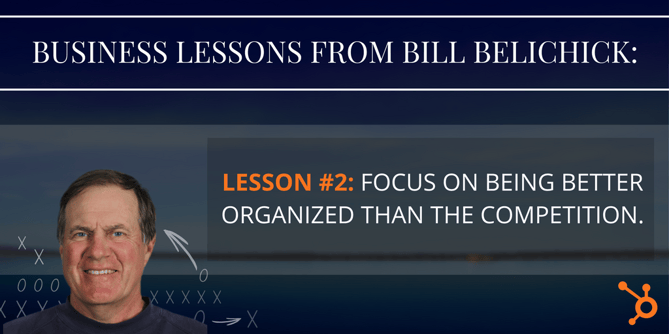
Belichick believes that being better "organized" than the competition is the way to win.
Lesson #3: Always challenge the status quo. [Tweet this]
.png?noresize&t=1486401306060&width=669&name=Bill_Belichick_Business_Lessons_7%20(1).png)
Belichick created a "modern, sophisticated" team that played by different rules and valued different skills/metrics than any other team. He exploited market inefficiencies much like a hedge fund would.
Lesson #4: Effective team management matters. Invest in it. [Tweet this]
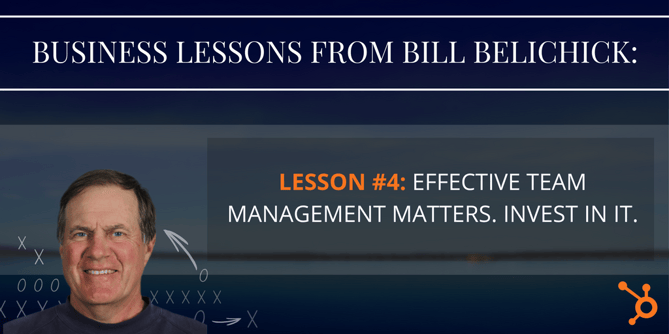
After losing a particularly important playoff game to an injury-ridden Patriots team, Peyton Manning (MVP that year) commented that, "it doesn't seem to matter who they trot out there, it's their 'system' that wins them games." It seems that winning football games is more closely correlated with smart management than talented players.
Lesson #5: Don't let your ego get in the way. [Tweet this]
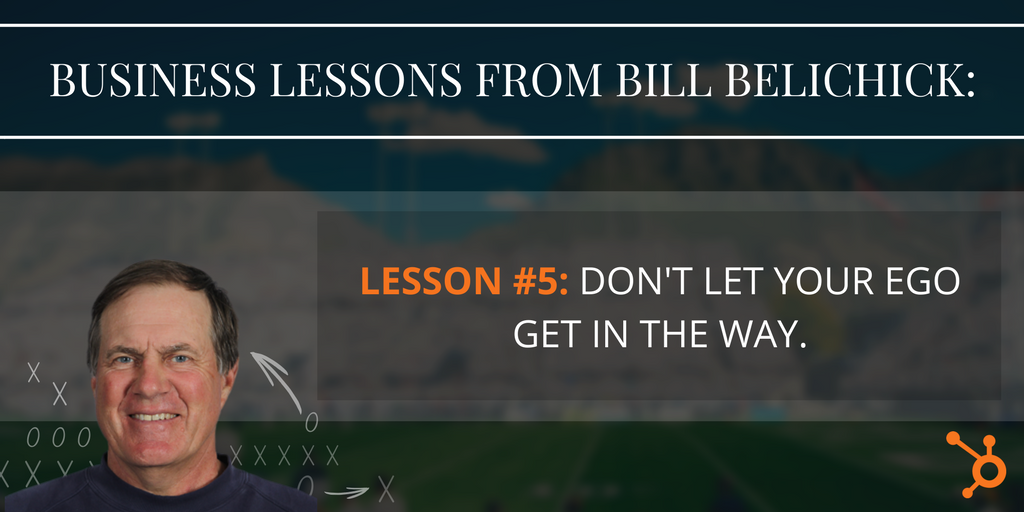
After having success, Belichick fought to keep the ego out. He feels like ego is a poison that kills teams.
Lesson #6: Team > individual. [Tweet this]
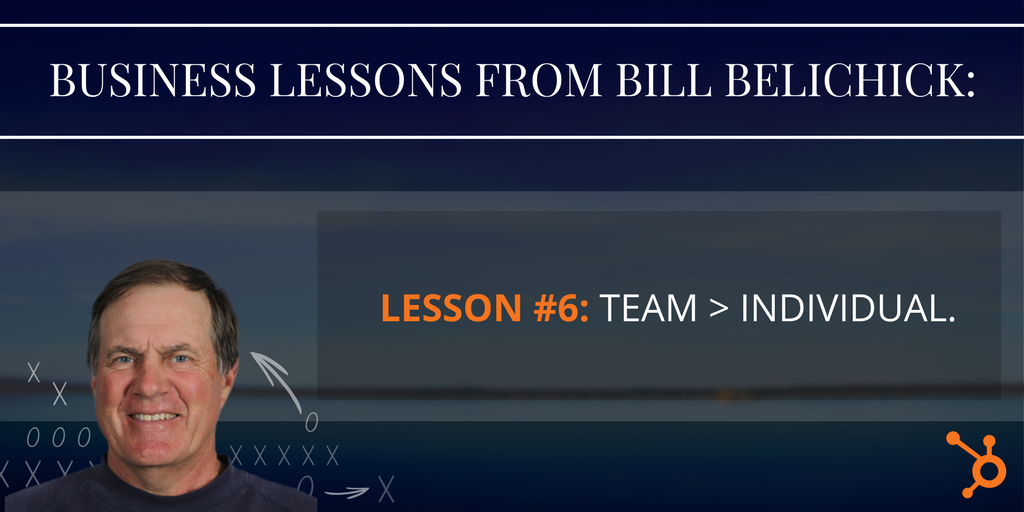
Belichick is all about the team first and individual second.
Lesson #7: Get to know your competition inside and out. [Tweet this]

Belichick's father was an assistant football coach at the Naval Academy. His main role there was to scout opponents. Belichick literally grew up looking at opponent film with his father. He became an expert at finding weaknesses in his opponents' offenses and defenses.
In particular, he became very good at identifying quarterbacks' weaknesses. For example, he would track metrics on accuracy throwing left, right, center, short, and long while standing still, while moving out of the pocket left, and moving out of the pocket right. Based on those metrics, he would design his defensive schemas.
Belichick won five Super Bowls because he was better at understanding his enemy than anyone else. Not sure if he ever read The Art of War, but he's Sun Tzu's modern day poster child.
Lesson #8: Use data to drive your decisions. [Tweet this]
.png?noresize&t=1486401306060&width=669&name=Bill%20Belichick%20Business%20Lessons%202%20(3).png)
From the book and the interview, it struck me that Belichick uses a sophisticated information technology platform to help unearth counter-intuitive insights about his business to create competitive differentiation.
What business lessons did we miss? Share them with us in the comments below.

No comments:
Post a Comment